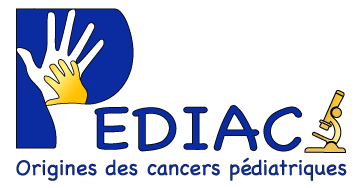RESEARCH TEAM Isabelle Janoueix-Lerosey
Genetic alterations and
epigenetic plasticity in neuroblastoma
The research carried out at Institut Curie by Isabelle Janoueix-Lerosey focuses on neuroblastoma, a cancer of young children that develops from the
sympathetic ganglia and the adrenal gland. The survival of children with high-risk forms still remains below 40%. Neuroblastoma occurs mainly sporadically, however some tumors are observed in a familial or syndromic context. The team has contributed to the characterization of recurrent genetic alterations in neuroblastoma, with the demonstration of their prognostic impact and the discovery of
ALK gene mutations in sporadic and familial forms of the disease. The ALK gene, which encodes a receptor with
tyrosine kinase activity, represents a therapeutic target when mutated, and various inhibitors are in clinical trials for the treatment of young patients. The team has developed mouse models of neuroblastoma, with overexpression of the
MYCN gene and / or mutation of the Alk gene to characterize the tumor phenotype and define the impact of
Alk mutations on the development of the sympathetic ganglia.
In addition, the team recently studied the epigenetic
landscape of neuroblastoma, and described two distinct cell identities in neuroblastoma cell lines. Cells of the two identities show notable differences in their behavior, particularly in terms of chemotherapy resistance
and regarding their migration potential. Current data demonstrate that intrinsic factors and signals from the microenvironment dictate cell identity in this pediatric cancer. The team recently set up experiments to explore
the intra–tumoral heterogeneity of cell lines, of different murine models and, thanks to a collaboration with pediatricians and radiologists from the SIREDO center of the Institut Curie, also analyzes tumor samples from patients. The team performs various molecular analyses including transcriptomics at the single cell level with the 10X Genomics technology available on the NGS platform of the Institut Curie.
In this context and within the framework of the PEDIAC project, the team will define how the genes involved in tumor initiation and predisposition to neuroblastoma control the homeostasis of the sympathetic ganglia and the adrenal medulla and modify the ecosystem of these tissues at different stages (during development and from birth to adulthood). These analyses will be performed on murine models available in the laboratory using single cell transcriptomic analyses.
The data obtained will be compared with the results observed on PDX models and patient samples, in order to describe the
interaction between tumor cells and various populations of the microenvironment, including immune and stromal cells. Functional analyses will then be carried out to better define the mechanisms involved in tumor initiation and to identify potential key interactions that can be targeted. Finally, screening approaches will be performed to identify key genes and microenvironment signals controlling cell identity in neuroblastoma.
